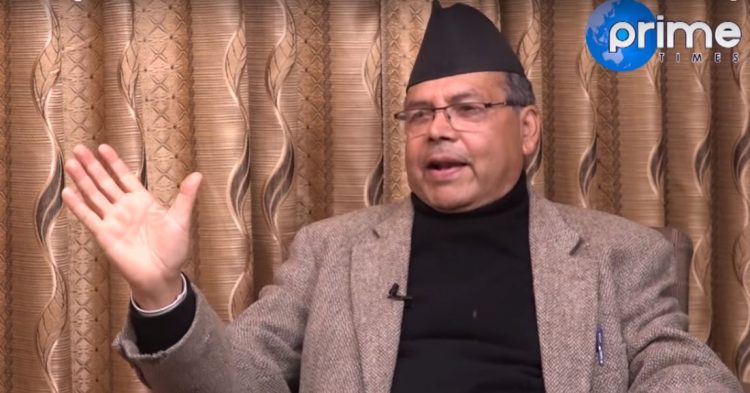Deputy speaker Tumbahangphe is still a member Nepal Communist Party
Sanjog Shiwakoti / January 16, 2020

NCP leader and former prime minister Jhalanath Khanal
Senior leader of the Nepal Communist Party (NCP) and former Prime Minister Jhalanath Khanal speaking on the ‘Janata Janna Chahanchan’ program aired on Prime Times television, on January 14, 2020 made the following claims:
First claim:
“The ruling party also can field its candidate [for speaker]. The deputy speaker [Shiva Maya Tumbahangphe] is just presiding over [the House] now…She is presiding over the House for the purpose of holding [speaker’s] election. The deputy speaker need not resign because, after the election, if both the speaker and deputy speaker are from the same party then the post of deputy speaker gets scrapped automatically.” [go to 12 mins 15 secs]
Second claim:
“It will not be right to say that the deputy speaker was from the Nepal Communist Party, she still is a member of the party.” [go to 17 mins 10 secs]
South Asia Check has examined Khanal’s claims one by one.
First claim: “The ruling party also can field its candidate [for speaker]. The deputy speaker is just presiding over [the House] now…She is presiding over the House for the purpose of holding [speaker’s] election. The deputy speaker need not resign because, after the election, if both the speaker and deputy speaker are from the same party then the post of deputy speaker gets scrapped automatically.”
Clause 2 of Article 91 of The Constitution of Nepal 2015 states: “Election under clause (1) shall be so held that there is one woman out of the Speaker and the Deputy Speaker, and the Speaker and the Deputy Speaker of the House of Representatives shall be representatives from different parties. Provided that if there is no representation of more than one party in the House of Representatives or no candidacy is filed by more than one party in spite of representation, nothing shall prevent the members of the same party from being the Speaker and the Deputy Speaker of the House of Representatives.”
According to the constitutional provision, the ruling party can elect its own candidate as speaker only if no other party fields candidate for the post. This shows Khanal’s first claim is false.
Second claim: “It will not be right to say that the deputy speaker was from the Nepal Communist Party, she still is a member of the party.”
The constitution is silent on this matter, but sub-section 1 of section 33 of the Political Parties Act 2073 states the following:
“If a member of a political party resigns in writing from his/her party’s membership citing his/her election to speaker or deputy speaker of the House of Representatives, chairman or vice-chairman of the National Assembly or speaker or deputy speaker of provincial assembly as the reason, this will not be regarded as the member’s disassociation from the political party.”
This provision shows Tumbahangphe’s resignation from her party, the Nepal Communist Party, upon her election to deputy speaker should not be counted as her disassociation from the party – she is still a member of the Nepal Communist Party. Therefore Khanal’s second claim is right.
This material is copyrighted but may be used for any purpose by giving due credit to southasiacheck.org.
Comments
Latest Stories
- In Public Interest Covid-19 cases are low, but that’s not an excuse to avoid vaccination
- In Public Interest What is BF.7, the sub-variant that has the world by its grip?
- In Public Interest Threat of a new Covid-19 wave looms large amid vaccine shortage in Nepal
- In Public Interest As cases decline, Covid-19 test centres in Kathmandu are desolate lot
- In Public Interest Dengue test fee disparity has patients wondering if they’re being cheated
- In Public Interest As dengue rages on, confusion galore about what it is and what its symptoms are. Here’s what you need to know
In Public Interest
 Covid-19 cases are low, but that’s not an excuse to avoid vaccination
The Pfizer-BioNTech bivalent vaccines authorised by the Nepal Government provide better protection a...
Read More
Covid-19 cases are low, but that’s not an excuse to avoid vaccination
The Pfizer-BioNTech bivalent vaccines authorised by the Nepal Government provide better protection a...
Read More
- What is BF.7, the sub-variant that has the world by its grip?
- Threat of a new Covid-19 wave looms large amid vaccine shortage in Nepal
- As cases decline, Covid-19 test centres in Kathmandu are desolate lot
- Dengue test fee disparity has patients wondering if they’re being cheated
- As dengue rages on, confusion galore about what it is and what its symptoms are. Here’s what you need to know